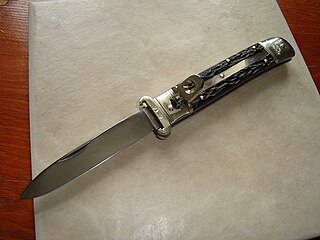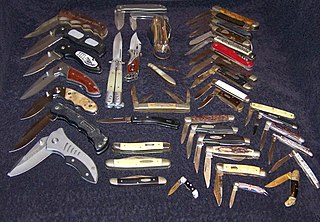
A switchblade is a type of knife with a folding or sliding blade contained in the handle which is opened automatically by a spring when a button, lever, or switch on the handle or bolster is stroked. Most switchblade designs incorporate a locking blade, in which the blade is locked against closure when the spring extends the blade to the fully opened position. The blade is unlocked by manually operating a mechanism that unlocks the blade and allows it to be folded and locked in the closed position.

The Benchmade Knife Company is a knife manufacturer run by Roberta and Les de Asis in Oregon City, Oregon, United States. Its products are sold to numerous markets, such as outdoor sporting cutlery, rescue, law-enforcement, martial-arts, and military. The company has collaborated with a number of custom knife makers since its inception.

A pocketknife is a foldable knife with one or more blades that fit inside the handle that can still fit in a pocket. It is also known as a jackknife (jack-knife) or a penknife, though a penknife may also be a specific kind of pocketknife. A typical blade length is 5 to 15 centimetres. Pocketknives are versatile tools, and may be used for anything from opening an envelope, to cutting twine, slicing a piece of fruit or even as a means of self-defense.
A gravity knife is a knife with a blade contained in its handle, and which opens its blade by the force of gravity. As the gravity knife requires gravity or spinning motion to propel the blade out of the handle, it differs fundamentally from the switchblade, which opens its spring-propelled blade automatically upon the push of a button, switch, or fulcrum lever. The main purpose of this opening method is that it allows opening and closing to be done one handed, in situations where the other hand is occupied. A major historical use has been in issue to parachutists to cut off their parachutes when tangled in a tree or in similar situations.
The Opinel company has manufactured and marketed a line of eponymous wooden-handled knives since 1890 from its headquarters in Saint-Jean-de-Maurienne, Savoie, France—where the family-run company also operates a museum dedicated to its knives. The company sells approximately 15 million knives annually. Opinel knives are made of both high carbon and stainless steel, the latter being the highest quality Sandvik steel from Sweden.

Gerber Legendary Blades is a maker of consumer knives, multitools, and other tools headquartered in Tigard, Oregon, United States, within the Portland metropolitan area. Currently, Gerber is a sub division of Fiskars Brands Inc, owned by the Fiskars company of Finland. Gerber was established in 1939 by Pete Gerber. Gerber was the first production knife company to collaborate with a custom knife maker when it collaborated with David Murphy.

An assisted-opening knife is a type of folding knife which uses an internal mechanism to finish the opening of the blade once the user has partially opened it using a flipper or thumbstud attached to the blade.

Ernest R. Emerson is an American custom knifemaker, martial artist, and edged-weapons expert. Originally an engineer and machinist in the aerospace industry, Emerson became a knifemaker by producing knives for a martial arts class and making art knives early in his knifemaking career. In the 1980s he became better known for his combat knives and popularizing a style of knife known as the Tactical-folder.

Christopher Stanley "Chris" Reeve is a South African-American knife maker, recognized as one of the most influential people in knife making history. Reeve founded Chris Reeve Knives (CRK), and is co-owner of the company with his wife, Anne Reeve. In 2015 he was inducted into the Blade Magazine Hall of Fame.

Ken Onion is an American custom knifemaker based in Kaneohe, Hawaii, United States who invented the "SpeedSafe" assisted opening mechanism for Kershaw Knives. Ken Onion was the Premier Knife Designer for Kershaw Knives.

The Linerlock is a locking mechanism for folding pocket knives. A Linerlock is a folding knife with a side-spring lock that can be opened and closed with one hand without repositioning the knife in the hand. The lock is self-adjusting for wear. The modern Linerlock traces its lineage to the late 19th century, but in the 1980s the design was improved by American custom knifemaker Michael Walker.

An OTF Knife, also known as an out-the-front knife, sliding knife, or telescoping knife, is a pocketknife with a blade that opens and closes through a hole in one end of the handle. Contrast this with the majority of knives, which are either standard folding knives or are "fixed blade" sheath knives.
Chris Reeve Knives is an American knife manufacturing corporation with international sales and distribution headquartered in Boise, Idaho, that designs, develops, and sells folding pocket knives and fixed-blade knives. Its products include the Sebenza, Inkosi, Umnumzaan, TiLock, Mnandi folding knives, Impinda slip joint, and the Green Beret, Pacific, Professional Soldier, Nyala, and Sikayo fixed blade knives. Chris Reeve Knives' industry contributions include the Integral Lock, contributions to the blade steel CPM S35VN, and has won Blade Magazine's Blade Show Manufacturing Quality Award 15 times. Their motto is Think Twice, Cut Once.

The CQC-6 or Viper Six is a handmade tactical folding knife with a tantō blade manufactured by knifemaker Ernest Emerson. Although initially reported as the sixth design in an evolution of fighting knives and the first model in the lineup of Emerson's Specwar Custom Knives, Emerson later revealed that the knife was named for SEAL Team Six. It has a chisel-ground blade of ATS-34 or 154CM stainless steel and a handle made of titanium and linen micarta. The CQC-6 is credited as the knife that popularized the concept of the tactical folding knife.

The SARK or NSAR is a folding knife designed by knifemaker Ernest Emerson for use as a search and rescue knife by the US military. It has a hawkbill with a blunt tip in order to cut free trapped victims without cutting them in the process. There is a variant with a pointed-tip designed for police, known as the P-SARK.
Emerson Knives, Inc. is an American company that produces knives and related products. It was founded in 1996 by custom knifemaker Ernest Emerson in an effort to mass-produce his folding knife designs for the U.S. Military and collector markets.

The Commander (knife) is a large recurve folding knife made by Emerson Knives, Inc. that was based on a custom design, the ES1-M, by Ernest Emerson that he originally built for a West Coast Navy SEAL Team. It was winner of the Blade Magazine Overall Knife of the Year Award for 1999.














